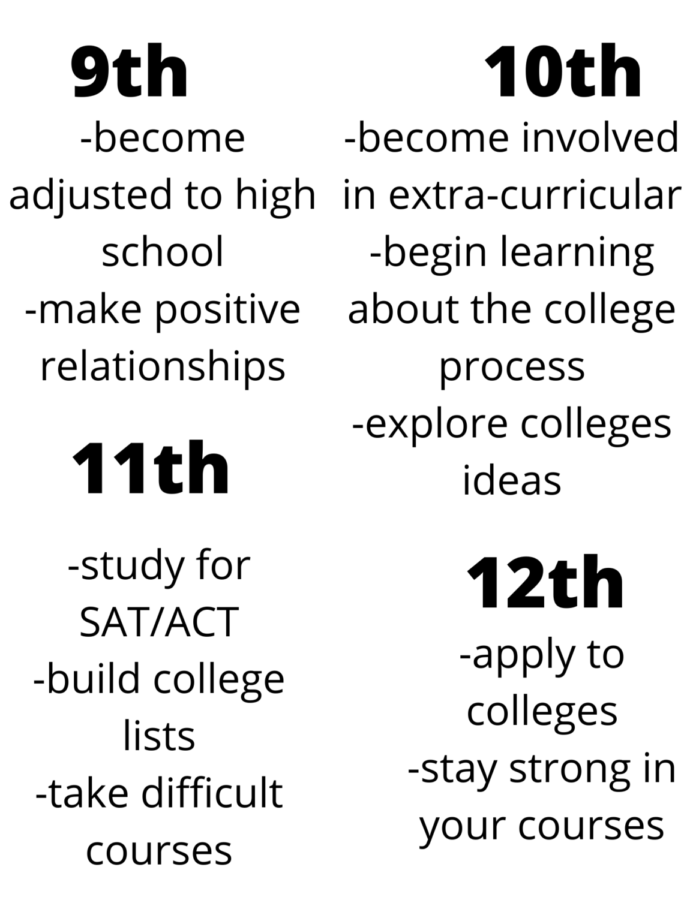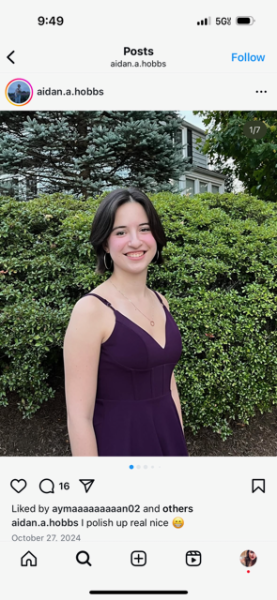College Tips for Underclassmen, by Upperclassmen
Understanding the college application process
Most students know the drill. Upon entering junior year, work on those SATs, think about colleges and visit them to show dedicated interest. Either the summer before or at the start of senior year, it is time to start working on those applications.
Although it depends on the school, college deadlines start early in the fall/winter. In a typical application, students must submit their essay answers to prompts, their report cards, SAT/ACT scores (some schools are test-optional), and recommendation letters from teachers in subjects they have thrived in.
Students are generally encouraged to apply to at least 7-9 schools, with three being safety schools, three being target schools, and three being reach schools. While these schools depend on you as a student with how your GPA and SAT/ACT match up to other students, an acceptance rate below 20% is generally considered a reach school.
One important note for students to understand is that acceptance rate isn’t all you need to consider, as state schools (University of Virginia, University of Michigan, etc)., simply take in more students because they are given tax money and need to take in more students from their state.
However, how students choose to plan for college depends on the student. Both juniors and seniors are quite invested in the application process for similar and different reasons. While junior year may be well-known for being the most difficult year in high school for its difficult course load and college prep, senior year introduces actually filling out the applications.
In order to determine the differences and similarities between the two and provide advice, juniors, seniors, and a college advisor were interviewed to discuss their experiences.
Junior Devan Opper, a Junior at Washington-Liberty High School, shared his experiences. He is planning on a major in economics and wants to go to business school for graduate school and work in macroeconomics or investment banking with an emphasis on emerging markets.
Although most juniors do not start thinking about applications until mid-junior year, Opper began his sophomore year. This was so he would have time to become adjusted and dedicated to the process.
“My first serious exposure to the application process was actually in March 2020,” Opper said.” I came across a series about at-home activities, and based on the YouTube recommendations, I began to watch videos relating to academics and student life at these universities and started to research the different universities that the students were applying to and the academic resources offered at these schools. I really fell in love with all of the opportunities that some of these schools offered.”
Opper, whose top schools are selective, described how he navigates the application process while managing stress.
“I’ve [been able to] avoid the stresses of the application process [by] exploring all the campuses’ different opportunities rather than solely focusing on the acceptance rates,” Opper said. “With an emphasis on each school’s resources rather than the prestige, I know that even if I don’t quite reach my dream school, I’ll still know that I will end up somewhere where I can achieve well.”
Opper had some tips for underclassmen beginning to look at testing options, specifically regarding the SAT.
“One [tip] would be to take the SAT early,” Opper said. “I took my first SAT in March of my sophomore year. I got a good score in range for most of my schools, but I wanted to make sure it was a little bit higher for my top choice. After taking it again, I reached the score that I needed.”
Opper offered another piece of advice.
“Another thing would be to not get your heart set on a single dream school,” Opper said. “My dream school has a low acceptance rate, so I am making sure to apply to a large diversity of schools. I’d say for freshmen and sophomores who are building their college list to make room for other college choices that have higher acceptance rates so that even if you don’t get into your top choice, you’ll still have a choice with all of the opportunities that you will need to perform well.”
Students generally start building their college list in junior year, with about 7-9 options that represent safety, reach, and target schools.
According to Opper, his experience at the school has helped prepare him for the future.
“I think that it’s been positive. I know the effort I’m putting in and I know that even if this process and my results don’t go well for me, I’ve still developed the intrinsic motivation, study habits, and research skills that I will need for future application processes,” Opper said.
Kaylee Board, a senior at the school, also chipped in on how she spends her time. She will attend Clemson for rowing.
Echoing Opper, Board emphasized the importance of starting early.
“I would start applications and get your common app essay done pretty early on,” Board said. “I applied to all my schools by the beginning of September, so I didn’t have to worry about it during senior year, which was really nice because you won’t have to worry about doing college apps with [internal assessments] and your extended essay [if you’re full IB].”
Board reflected on her years, both stressful, and mentioned how they differed.
“I’d say junior year was really stressful even though it was online just because of course load, but senior year was more stressful because there were more deadlines, and there was college stuff to worry about,” Board said.
Board also discussed the impact of the pressures of the high school experience at the school, particularly with IB.
“It definitely puts that pressure on us, like ‘this is what you need to be doing,’” Board said. “You need to be constantly doing something. Honestly, I started being a lot more social my senior year, and I wish I would have done that earlier in high school. I would have gone to every football and hockey game, hung out with friends every weekend, and even gone out sometimes during the week instead of just solely focused on academics…. While they’re really important, I still think I could have gotten to as many places as I did without putting the stress and pressure on myself that I did. You got to build in some time for yourself too.”
Board applied to seven schools in total.
“I got rejected from one, and I credited [the acceptances] partially to just being full IB,” Board said. “It’s kind of a pain and there’s a lot of schools and a lot of work with it and extra content material you don’t have to do with other courses and APs. But you’ll be a good writer, it helped me get in places, and made me a well-rounded student.”
Board also offered tips for selecting a college to attend.
“I got into schools that were ranked better than where I’m going, I got into UVA and UNC and other places,” Board said. “It’s about where it could fit for you, what’s got the best program, and where you’re going to enjoy college because you’re going to be living there for four years. You can get a really great undergraduate education pretty much anywhere. It doesn’t really matter where you go to grad school. People just need to relax a bit more and be more confident in their choices and not regret, like not going here, not going there. In the end, everybody’s gonna get a good education no matter where you go.”
Amina Luvsanchultem, a senior at the school, plans on attending the Massachusetts Institute of Technology (MIT) next year.
Luvschanultem also recommended beginning the process early.
“My main advice for underclassmen would be to start early,” Luvschanultem said. “I had made the mistake of not starting my essays and not looking into colleges my junior year summer and hadn’t given myself enough time to apply to more colleges. I was only able to apply to my top choice school early action and had to wait a fairly long time to hear back from my schools since they were mostly regular decisions, so it definitely gives you more peace of mind when you start early and finish early.”
As for choosing extracurriculars, Luvschanultem advised underclassmen to follow their passions.
“I wish that I knew the importance that extracurriculars played in developing and shaping your application and essentially you as an applicant in the college process,” Luvschanultem said. “I recommend finding and getting involved with extracurriculars that you truly are interested in—not only the ones that look good for college—you want to make sure that you are showing colleges your true self. Through my extracurriculars, I was able to learn that I am extremely passionate about racial equity and philanthropy and so I made sure to pursue and elaborate upon those within my application.”
Luvschanultem applied to one school early action and six regular decisions.
“I thought that the college process was pretty intense once I started to apply to multiple schools at once.,” Luvschanultem said. “But being able to really focus on my top school for early action was really helpful as it was a quality over quantity scenario where the more schools I had applied to, I felt that my applications weren’t as strong since I had to spend time with other applications as well.
Luvschanultem also touched on her mental health during this time and the essay-writing process.
“To be honest, my mental health and stress levels were not great during the college application process because there were so many deadlines to meet, but keeping a tracker (planner) to stay organized had helped me to stay on top of everything,” Luvschanultem said. “Considering this, sometimes the best way to come up with an essay idea or answer an essay question is to sit with yourself and think about how you want to portray yourself to the college admissions officers.”
Luvschanultem referenced her own essay.
“For the college essays, there really isn’t a trick or secret to writing a good essay as colleges only want to see you as a person and the personal experiences that have shaped who you are,” Luvschanultem said.“Write how you want to write, for me, I like to write in a more descriptive, personal style so that I can immerse the reader in the essay, but if you are more poetic or objective, continue to write in a way that showcases your true self. For the essay, make sure you talk about something that makes you unique, it could be an extracurricular, writing style, an event or moment in life, etc. My common app essay focused on making dough for Mongolian dumplings and I described pieces of my life in the process of making the dough.”
Luvschanultem reflected on the activities she pursued to improve herself and ensure her application looked good to colleges.
“During my years leading up to senior year, I was involved with three main activities—NHS, AYPI, and a club that I had co-founded [Students for Racial Equity],” Luvschanultem said. “These had really helped me to gain leadership and communication skills as well as develop my own passions outside of school. I also greatly participated in summer leadership programs and pre-college programs which were really great since I was able to connect with people from across the nation (especially since most were virtual).”
Luvschanultem also offered advice for SAT prep.
“As far as SATs, I highly highly recommend Khan Academy.org as a source of studying material—I tried to study consistently with a friend for a few months to bring up my score and these sessions greatly helped my score,” Luvschanultem said. “I submitted my scores to my colleges, but since the scores are optional, there was a bit of pressure being lifted off SAT/ACT studying.”
Griffin Crouch, a junior at the school is taking both AP and IB classes and working on extracurricular activities.
While starting the college process, Crouch has yet to get into the groove of his college search.
“I have a tentative list of some colleges I want to look at and I’m not in the process at all yet. I haven’t really done anything enough.”
With regards to the programs that counselors offer to support students, Griffin admits students may not use those resources enough.
“I know that not everyone, myself included, fully uses it and don’t always talk to counselors about what I need for college stuff or for other classes. I think they do offer a good support system, even if it’s under-utilized.”
Ms. Elysse Catino, the College and Career Counselor at the school, discussed the school’s support systems in place to guide students through the application process, as well as her beliefs regarding stress.
Ms. Catino hosts many sessions for students regarding getting through the application process and believes there is a good support system in place for students — just not a high attendance. For reference, out of 500 juniors at the school, only between 60 and 70 students attended the most recent workshop.
“There are a lot of opportunities available for students to learn information, ask questions, and get help. Students may find the amount of information we provide overwhelming, and while we know it is a lot, the college application process is an intensive task, and we want to provide as much information and support as possible,” Ms. Catino said. “Students really need to take ownership of the process and take advantage of the resources available to them. It can be difficult to navigate that change. That’s why we start going into classrooms and hosting sessions in junior year.”
Junior year should be viewed as the serious college “thinking” stage, whereas past years need to be more focused on the classes that you are in.
“Junior year is when students start thinking about colleges, it is the search and exploration part of the process,” Ms. Catino said. “Ninth and tenth grade should be about doing well in school, thinking about the subjects that you’re interested in, and getting involved whether that is with W-L or in the community. By 11th grade, the focus needs to shift toward what students want for their future. If it is college, students need to put emphasis on their important factors, visiting campuses, college admission testing, and preparation for senior year.
As for which year is harder out of junior and senior year, Ms. Catino voted senior year.
“I think they’re stressful for different reasons. Students who fully immerse themselves in the college application process often find senior year most stressful because they are still engaged in their normal coursework and activities but now you have the whole college application process,” Ms. Catino said. “Many students don’t take the opportunity to prepare to go into senior year and so it can feel like a lot right at the beginning of that year.”
In terms of class selection and college-level classes as an upperclassman, Ms. Catino recommended a more balanced approach targeting one’s strengths.
“You don’t have to take college-level classes in all subjects; some students will, and they’re prepared for that and they’re going to do well,” Ms. Catino said. “But many students are not ready. Students should choose the content areas that they’re interested in and challenge themselves there. If you are interested in psychology, choose the AP or IB in that content area. Maybe you’ve always been a strong science student and maybe that’s where you choose to challenge yourself. Always think about your interests and your strengths. That’s where to look for those AP and IB classes.”
While many students only hear about others going to four-year colleges, some students at the school select alternate paths.
“Eighty-one percent of last year’s class went to a four-year school, about 11 percent to a two-year school, and then the rest are doing something else. That could be a gap year, joining the military, or entering the workforce,” Ms. Catino said. “Overall, in recent years we hover around 90% of our graduating students doing formal 2- or 4-year college education.”
When asked about her advice to students going through the application process, Ms. Catino emphasized the value of believing in oneself.
“Don’t put so much pressure on yourself,” Ms. Catino said. “There are thousands of colleges available for students to attend. Often, there is a heavy burden over the heads of students that you have to go to certain colleges. You’re going to go somewhere and everyone’s going to do really great things because there’s a great fit college for everyone. My hope for students going into the application process is to know that college is a starting point, it’s not an ending point. Take the pressure off, be your authentic self, and open your eyes and ears to opportunities that you may not have considered in the past. If you put in the time and effort, everyone is going to find a great fit college if that is the path they choose.”
What did you think about this story? Do you have any suggestions for improvements or other articles that you would like to see? Please use the contact form to communicate with us! (Keep all information school-appropriate)
https://docs.google.com/forms/d/e/1FAIpQLSeRYRWwLLzvs2rqwHSGdr-DQRvxhUSx9UcaXypXxnvVuCqwyA/viewform










